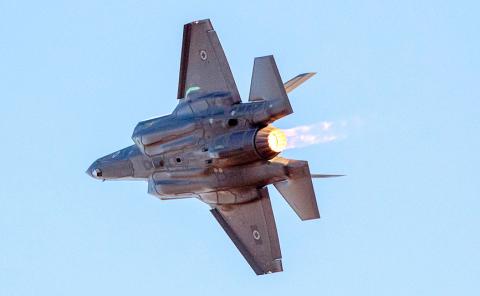Taiwan is to submit a letter of request to purchase Lockheed Martin F-35 jets, top defense officials told their US counterparts at the Monterey Talks in Hawaii last week, the highest-level defense dialogue between the two nations.
Although US officials prior to the talks privately urged Taiwanese officials on several occasions to forgo asking for the jets, National Security Council Deputy Secretary-General York Chen (陳文政) told them at the meeting that Taiwan remains committed to the request, an anonymous government source said.
US officials were cited by the source as saying that US President Donald Trump’s administration cannot agree to sell Taiwan the fighters, and the nation should consider its defense needs pragmatically.

Photo: AFP
The delegation was headed by Chen, Vice Minister of National Defense Admiral Pu Tze-chun (蒲澤春) and Major General Hung Kuang-ming (洪光明), the deputy military attache.
The US officials at the meeting included US National Security Council Senior Director for Asian Affairs Mathew Pottinger and US Acting Assistant Secretary of Defense David Helvey.
No senior US Department of State officials attended.
The US officials said all arms sales to Taiwan approved by the Trump administration have been weaponry or equipment requested from former-US president Barrack Obama’s administration, the source said.
Taiwanese officials were told that the request for F-35 jets would require a new letter that must be evaluated by the departments of state and defense, the source said.
While it is relatively easy for Taiwan to buy stockpiled missiles and other munitions, it is considerably more difficult to buy new platforms, they said.
Furthermore, the US government does not encourage foreign governments to submit letters of request for arms that the US has expressed a disinterest in selling, the source said.
When Chen spoke of how Chinese military aircraft have been skirting Taiwan’s airspace, Pottinger said the US “understands” Taiwan’s position, but did not elaborate.
Taiwanese officials asked the US to begin cooperation of cyber security and requested assistance for an indigenous submarine program, the source said.
Admiral Harry Harris — commander of US Pacific Command — was not at the talks, but met the delegation separately at the Pacific Command headquarters, the source said.
This story has been corrected since it was first published.

CHAOS: Iranians took to the streets playing celebratory music after reports of Khamenei’s death on Saturday, while mourners also gathered in Tehran yesterday Iranian Supreme Leader Ayatollah Ali Khamenei was killed in a major attack on Iran launched by Israel and the US, throwing the future of the Islamic republic into doubt and raising the risk of regional instability. Iranian state television and the state-run IRNA news agency announced the 86-year-old’s death early yesterday. US President Donald Trump said it gave Iranians their “greatest chance” to “take back” their country. The announcements came after a joint US and Israeli aerial bombardment that targeted Iranian military and governmental sites. Trump said the “heavy and pinpoint bombing” would continue through the week or as long

TRUST: The KMT said it respected the US’ timing and considerations, and hoped it would continue to honor its commitments to helping Taiwan bolster its defenses and deterrence US President Donald Trump is delaying a multibillion-dollar arms sale to Taiwan to ensure his visit to Beijing is successful, a New York Times report said. The weapons sales package has stalled in the US Department of State, the report said, citing US officials it did not identify. The White House has told agencies not to push forward ahead of Trump’s meeting with Chinese President Xi Jinping (習近平), it said. The two last month held a phone call to discuss trade and geopolitical flashpoints ahead of the summit. Xi raised the Taiwan issue and urged the US to handle arms sales to

State-run CPC Corp, Taiwan (CPC, 台灣中油) yesterday said that it had confirmed on Saturday night with its liquefied natural gas (LNG) and crude oil suppliers that shipments are proceeding as scheduled and that domestic supplies remain unaffected. The CPC yesterday announced the gasoline and diesel prices will rise by NT$0.2 and NT$0.4 per liter, respectively, starting Monday, citing Middle East tensions and blizzards in the eastern United States. CPC also iterated it has been reducing the proportion of crude oil imports from the Middle East and diversifying its supply sources in the past few years in response to geopolitical risks, expanding

Pro-democracy media tycoon Jimmy Lai’s (黎智英) fraud conviction and prison sentence were yesterday overturned by a Hong Kong court, in a surprise legal decision that comes soon after Lai was jailed for 20 years on a separate national security charge. Judges Jeremy Poon (潘兆初), Anthea Pang (彭寶琴) and Derek Pang (彭偉昌) said in the judgement that they allowed the appeal from Lai, and another defendant in the case, to proceed, as a lower court judge had “erred.” “The Court of Appeal gave them leave to appeal against their conviction, allowed their appeals, quashed the convictions and set aside the sentences,” the judges